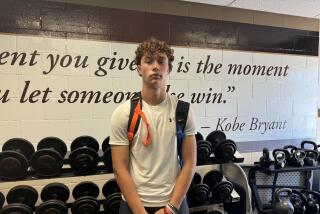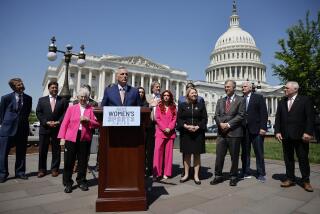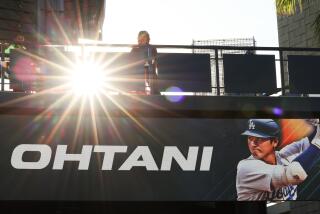Celebrities Certainly Do Run Deep in Stillwater
If sport is life on fast forward, the best running back in college football needs for somebody to push the hold button. One hour, Barry Sanders gives the impression he will scoot from Oklahoma State to the pros; next hour comes another bulletin: He’s staying.
Would that everyone could be in such pleasant turmoil. If Sanders returns for his senior season, he has a chance to make an even deeper dent in college history, as well as to move within a couple of academic first downs of his degree. Opting for the NFL makes him a millionaire.
These decisions never are easy--and a silent conspiracy between the NFL and the colleges makes it even more difficult and unseemly for Sanders. To get on with his chosen career, Sanders must violate an NCAA rule.
The assumption here is that Sanders eventually will run for the money. What is there yet to gain at Oklahoma State, besides more yards and more glory? So somebody insures his knees against a career-ending collision with a Nebraska linebacker. The AFC East might not hit as hard as the Big Eight.
That’s the cynical view. Anyone who wants a college degree will work toward it during his spare time in the pros. The Redskins’ Larry Brown got his diploma that way; so did the Pistons’ Adrian Dantley and lots of others.
There is a serious tug within Sanders to stay in college--and that warms us. Here might be a fellow who sees beyond the line of scrimmage, lots farther than the next touchdown. Maybe Sanders has a strong sense of loyalty to teammates suddenly caught in a probation-induced bind.
Ralph Sampson stayed. The almighty Red Auerbach came calling after Sampson’s sophomore season at Virginia, also dangling a fortune. Sampson said no to Auerbach--and no again to the NBA after his junior year. Still the top pick in the NBA draft, he left with a degree and no regrets.
Even at Oklahoma State, Sanders is getting pulled in opposite directions. Athletic interests are happy to have a Heisman Trophy winner flitting about the country, picking up all those awards, planting the school’s unfamiliar football name in the minds of recruits; academic interests refuse to overlook Sanders’ absence.
“A lot of things have happened back at school, and all of them seem to be bad for Barry,” his father said. “ . . . the professors haven’t worked with him and let him take the exams they said they would.”
Making immense sense, the elder Sanders said: “If he’s going to play 11 games next year, he might as well play 16 and make some money.” As usually happens, the mother wants her son to keep running toward his degree.
Whatever his timetable, the NFL will welcome Sanders. He might be smallish (5-foot-8), but those numbers against Oklahoma and Nebraska last year were stupefying.
No holes in those films is the relevant football expression, meaning nothing needs to be doctored to make Sanders impressive.
For Sanders to become eligible for the draft, he must do something much of the public, some of the NFL and all of the colleges consider naughty. He must hire an agent, or commit another crime that causes him to lose his eligibility.
“If he wants to come out,” said one NFL executive, “he’ll be out. We kinda accept that. We don’t like it, but we accept it. I haven’t studied him, but it’s hard to believe he wouldn’t be a good pro.”
Still, good as he is, Sanders might not leave as lasting an impact on college sport as a teammate, wide receiver Hart Lee Dykes. In his peculiar way, Dykes, an almost certain first-round draft pick, has had a career for the ages.
If the NCAA kept stats on recruiting, Dykes almost surely would be the all-time leader in the category: most schools turned in (four). According to reports, they are Illinois, Oklahoma, Texas A&M; and his own Cowboys campus in Stillwater.
More evidence than Dykes offered led to those convictions. For testifying against his school, Dykes was granted the immunity that allowed him to play--and make all-America--last season.
The NCAA never discusses specifics, but the wooing of Dykes must have been unimaginably wild. Even the best basketball players rarely are involved with more than two schools being put on probation. Dykes doubled that.
This puts him in select company. He joins David Thompson and Moses Malone, in whose honor NCAA rules were significantly altered. After Thompson, a team no longer could use in the NCAA tournament a player it had recruited illegally. After Malone, the number of schools a prospect could visit were slashed, from unlimited to six.
Primarily because of Wilt Chamberlain, the free-throw lane was widened; primarily because of Kareem Abdul-Jabbar, dunking was outlawed for several years; primarily because of John Wooden, jump balls only take place at the start of games and overtimes; primarily because of Washingtonian J. Dallas Shirley, there is a three-point shot.
Patrick Ewing is the reason a T-shirt must match closely the player’s uniform shirt, said rules official Shirley, who added: “We learned of one school (trying to confuse opposition ballhandlers) that had T-shirts in six different colors.”
So Dykes joins the collegiate immortals. Less obvious than his buddy Sanders, he has left an impressive wake.
More to Read
Go beyond the scoreboard
Get the latest on L.A.'s teams in the daily Sports Report newsletter.
You may occasionally receive promotional content from the Los Angeles Times.










